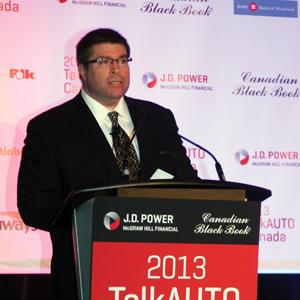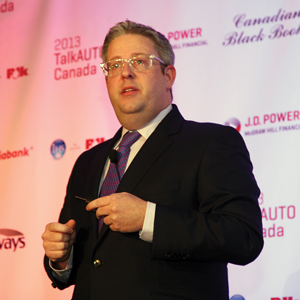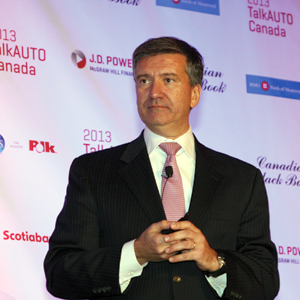A HEALTHY DEALER DISCUSSION, ELECTRIC MOBILITY AND THE GENERATIONAL DIVIDE WERE JUST SOME OF THE HIGHLIGHTS OF THE SECOND ANNUAL TALKAUTO CANADA CONFERENCE

Dealer discussion panel proved lively and in-depth
Any opportunity where people get a chance to meet, network and share ideas can only serve to benefit those who attend. And so it was the case for the 2013 TalkAUTO Canada conference, co-presented by J.D. Power and Canadian Black Book.
Taking place at the Toronto Congress Centre, it included a wide variety of speaking sessions, networking breaks and workshops.

Darren Slind

Jeff Schuster
Things kicked off early with a networking breakfast at 7:30 am. This was followed by an introduction and welcome address from Ray O’Kane, managing director, head of National Retail Dealer Finance at Bank of Montreal (a platinum sponsor of this event) along with introductions from Larry Shred, president of Canadian Black Book and Darren Slind, senior director and Regional Practice Leader for Canada and Latin America at J.D. Power, who also served as emcee for the event.
SLOW BUT STEADY
It can be hard to predict the future, especially in today’s rapidly changing world, yet Jeff Schuster, senior vice-president of Forecasting at LMC Automotive, provided some interesting observations in his Canadian automotive sector outlook presentation. Schuster said that in terms of GDP growth, the economy is expected to stay under two per cent, though the auto sector as a whole continues to perform well.
He said that compared with the pre-recession marketplace, inventory levels are being managed well, creating a positive environment, though arguably, perhaps the situation is too lean, with some OEMs struggling to keep pace with demand for certain models due to production and supply constraints.
As more manufacturers continue to invest in production facilities in Mexico, Schuster said he expects North America to become more of an export hub, while a greater number of vehicles sold here, will also be built here.
IT’S THE INSIDE THAT COUNTS
In his presentation entitled: Competitive advantage through the in-car experience, Mike VanNieuwkuyk, executive director, Global Quality Practice at J.D. Power, said that based on data the firm has gathered, both from the U.S. and in Canada, one of the biggest focal points in the auto industry today concerns the in-car experience.
He noted that in the U.S. at least, the average person spends two hours and 27 minutes in their vehicle, so what comfort, convenience and features that vehicle offers are hugely important.
VanNieuwkuyk also talked about safety and technology and that for consumers, features that provide security from elements outside the driver’s control receive stronger interest than those that are seen as interfering with their ability to pilot a vehicle.
Josh Bailey, vice-president, Research and Editorial with Canadian Black Book, gave an overview of Canadian used vehicle market trends.
He said that the market for used vehicles remains undersupplied and that it will be some time before we see a situation where stocks are plentiful. Bailey said a potential concern on the horizon relates to the job market in Canada and how that could impact vehicle sales. He said it’s not so much about employment numbers but the “quality” of that employment. “We have more people in positions where they are working part time or on contract,” he said. “If there is any hiccup in the economy, those people are susceptible to being let go. The rosy number (the government portrays) therefore isn’t really a rosy number.”

Josh Bailey

Eduardo Villaverde
HEARTY DEALER DISCUSSION
One of the key highlights of the inaugural TalkAUTO event last year was the dealer discussion panel.
Moderated by Allison Goodwin, director of Pre-Owned Vehicle Services at Roy Speed & Ross, this year’s panel consisted of Christopher Pfaff, president of Pfaff Automotive Partners, Shawn Morris, vice-president of operations, Grand Touring Automobiles, Hugh Sisley, owner and president of Sisley Honda and Francesco Policaro, general manager, Porsche Centre Oakville.
All the panelists acknowledged that changes are happening in the car business like never before and that customer expectations are higher than ever. Christopher Pfaff said that in terms of technology in today’s vehicles and being able to show customers what features a vehicle has, it’s important for the dealership to plan a time that’s convenient for both the store and the customer.
Francesco Policaro said it was important for dealers to be able to understand different personalities when it comes to customers and to tailor an experience that is appropriate to them. He noted that some might prefer having dealership staff come to them, while others prefer to come into the store for a workshop. He said that dealers who operate multiple franchises can take advantage of the fact that much of the technology within vehicles is very similar, so inviting customers who’ve purchased different brand vehicles collectively to a workshop can also be a good way in explaining how a specific technology works.
A big shift that’s happened in the industry over the last 25 years, especially in terms of franchised dealerships, has been the growth in the used car market. Certified Pre-Owned (CPO) cars have become increasingly important for many dealers when it comes to their used inventory. Francesco Policaro said the onus is on stores to re-condition vehicles before they sell them, not to have it done afterwards. He said it was important to treat customers the same way whether they’re buying new or used and that CPO customers can contribute significantly to service retention.
Shawn Morris said there has been a growing emphasis on used vehicles because dealers have 100 per cent control over the process and that it feeds all other departments at the store. “For us, used cars are part of our strategic plan,” he said. “The biggest challenge we have is that we need to be more focused on the retail side (as opposed to wholesale) and trade-ins.”
Hugh Sisley noted that at his store, the grosses on used cars make them an attractive proposition (.6 to 1 ratio of new versus used). Nevertheless, he said that the business is challenging. He noted that today there are so many different channels that impact used prices and because CPO programs vary so much between manufacturers, it can be difficult for dealers to understand them, let alone customers.
AUDIENCE QUESTIONS
A major highlight and a source of interest for the discussion panel this year were the audience fielded questions, which covered topics ranging from dealership consolidation to long term financing. Where the latter was concerned, the panelists acknowledged that longer term finance contracts are not good for the industry, nor ultimately for customers, fueling negative equity and reducing the ability for customers to trade vehicles. Hugh Sisley labeled the practice “suicide,” while Francesco Policaro said that such contracts don’t take into account changes in customers’ circumstances or lifestyle. He said that even today, for stores like Porsche Centre Oakville “the holy grail” is still 24-48 month leases.
An interesting presentation was given by the two winners of the J.D. Power and Georgian College Research Analyst Program — post graduate students Melissa Gu and Sarah Mebrahtu. As a result of their efforts, Gu and Mebrahtu were offered the chance to speak at TalkAUTO this year, presenting findings from their research on Canadians and Fuel Economy: The Dollars and Sense. They analyzed and discussed topical issues facing the industry today, such as early buyer behaviour, technology adoption among consumers and the perception of fuel economy among Canadians.

BMW’s new all electric vehicle, the i3, made its official Canadian debut at TalkAUTO
EMPHASIZING ELECTRIC
This year’s keynote session was electrifying, literally, as Eduardo Villaverde, president and CEO of BMW Group Canada, talked about future mobility. He explained about the growth in the global population, how it will impact the planet’s resources, not to mention the ability for large companies to conduct business.
Villaverde talked about rapid population growth in places like Toronto and how that is going to impact transportation needs. And it is these needs that are fueling demand for electric vehicles.
Unveiling the battery electric BMW i3 for the first time in Canada, Villaverde said that for BMW, this vehicle represents the future, not only in terms of product but also service.
He referenced such features as a personalized purchasing process, home charging, partnerships with public charging station operators and a DriveNow car sharing program. The i3 is scheduled to go on sale during the first half of 2014.
Following Villaverde’s speech and a chance for attendees to get a good look at the i3, the afternoon breakout sessions got underway.
This year, there were four to choose from under two timeslots, which gave attendees the chance to attend one during each slot (1:45 pm and 2:45 pm). The sessions were A Generation Apart: Understanding the Next Generation Buyer; Under the Couch Cushions: Retail Growth Opportunities; Using Media to Your Advantage and It was the Best of Terms, It was the Worst of Terms, Long Term Auto Financing in the Canadian Market.
Canadian auto dealer had a chance to attend two of the sessions. In A Generation Apart: Understanding the Next Generation Buyer, presenter Kurt Tiltack, managing partner at Toronto-based management consulting firm Pathways Inc. talked about the generational divide and how those in business today need to learn to connect with younger buyers. Tiltack said there are certain events in history and culture that each group identifies with and it’s important for us to appreciate them and be able to connect with others on that level, as that is key to driving relationships and also business.
CAN WE RECOVER?
Brian Murphy, senior manager, Power Information Network, Canada, J.D. Power, talked about the impact of long-term auto financing on the industry. He said that when interest rates rise, manufacturers will no longer be able to afford to offer incentives that run up to 15 per cent of the value of a vehicle and that buyers will tighten their belts, essentially creating a perfect storm. “We need to consider whether this is the right thing to do,” he said, arguing that for dealers, offering 96-month financing means they are essentially shooting themselves in the foot.
In terms of potential solutions, Murphy referred to the successful business model employed by many luxury brands — short term leasing. “Leases are fantastic,” he said. “A customer acquires a car for less money with a warranty. The dealer gets a pristine car back for CPO use and they turn around and offer the customer a brand new one. It is a fantastic business model, provided you can deal with residual value risk. It is fantastic for consumers, for dealers and for the industry as a whole.”

















